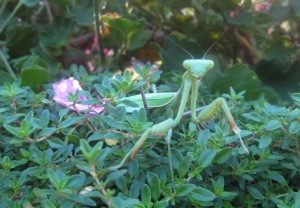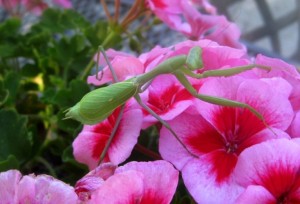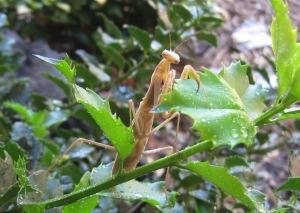“From whence arrived the praying mantis?
From outer space, or lost Atlantis?
glimpse the grin, green metal mug
at masks the pseudo-saintly bug,
Orthopterous, also carnivorous,
And faintly whisper, Lord deliver us.”
Ogden Nash
California Praying Mantis (Stagmomantis Californica)
Despite their odd, alien-like appearance, this hungry insect, thought of as lucky in China, is the gardener’s very best friend. They are about 3 inches long, have a mobile triangular head, ‘bugged out’ compound eyes, and thread-like antennae.
Praying mantises have voracious appetites, and will eat a variety of insects including Japanese beetles, aphids, grasshoppers, fruit flies, house flies, moths and crickets. Luckily we have mantises naturally here in the mountain area, but it’s possible to buy praying mantises and their egg cases just to control insects in the garden.
These slender graceful creatures, seemingly slow and deliberate, are lightning fast when it comes to catching prey and they have even been known to catch and eat hummingbirds, small snakes and mice.
A Nasty Surprise Attack
“The female praying mantis turns to the male and says, ” after sex but before I kill you, I’ll need help with some shelves….”
It is true that the females sometimes bite the head off the one they love, but that’s not always the case. Scientists study the fact that some males survive the mating process and puzzle over why the female behaves this way. Mostly these guys eat garden bugs which is great for you!
Female praying mantises mate in late summer and lay eggs in foamy masses on a plant stem. From each egg case, called an ootheca, 50-200 young mantis nymphs will hatch in the spring. Born hungry, they they know how to catch prey from the start and might even eat a few siblings before starting out in the garden. Oops!
For a short time after each molt they’re milky white. They soon darken to green or brown depending on their background. The mantis in the photo was found at the end of August, resting on a holly bush. Is it male or female? Wings of male extend beyond tip of abdomen; wings of female reach only to middle of abdomen.
It’s a treat to spot a praying mantis in your garden and next time, know that it’s working for you! Just be sure to protect your hummingbirds and watch out for any oothecas you might see on your winter walks!




